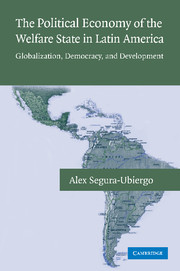 The Political Economy of the Welfare State in Latin America
The Political Economy of the Welfare State in Latin America Book contents
- Frontmatter
- Contents
- Tables and Figures
- Acknowledgments
- 1 Introduction
- 2 The Historical Evolution of Welfare Systems in Latin America: Qualitative Comparative Analysis
- 3 Theoretical Framework and Main Hypotheses
- 4 Determinants of Social Spending in Latin America: A Time-Series Cross-Section Analysis, 1973–2003
- 5 Chile: A Classic Latin American Welfare State under Authoritarian Stress (1973–1989) and Democratic Reinvention (1990–2000)
- 6 Costa Rica: Globalization, Gradual Reform, and the Politics of Compensation, 1973–2002
- 7 Peru: Political Instability, Regime Change, and Late Economic Reform in a Non-Welfare State, 1973–2000
- 8 Conclusion: Summary and Final Reflections on the Sustainability and Effectiveness of Latin American Welfare Systems
- Bibliography
- Index
5 - Chile: A Classic Latin American Welfare State under Authoritarian Stress (1973–1989) and Democratic Reinvention (1990–2000)
Published online by Cambridge University Press: 10 July 2009
- Frontmatter
- Contents
- Tables and Figures
- Acknowledgments
- 1 Introduction
- 2 The Historical Evolution of Welfare Systems in Latin America: Qualitative Comparative Analysis
- 3 Theoretical Framework and Main Hypotheses
- 4 Determinants of Social Spending in Latin America: A Time-Series Cross-Section Analysis, 1973–2003
- 5 Chile: A Classic Latin American Welfare State under Authoritarian Stress (1973–1989) and Democratic Reinvention (1990–2000)
- 6 Costa Rica: Globalization, Gradual Reform, and the Politics of Compensation, 1973–2002
- 7 Peru: Political Instability, Regime Change, and Late Economic Reform in a Non-Welfare State, 1973–2000
- 8 Conclusion: Summary and Final Reflections on the Sustainability and Effectiveness of Latin American Welfare Systems
- Bibliography
- Index
Summary
This is the first of three chapters that expand the quantitative findings of Chapters 3 and 4 through a more detailed comparative analysis of three cases – Chile, Costa Rica, and Peru. The purpose of these case studies is twofold: first, to better specify some of the causal mechanisms underlying the main statistical relationships among globalization, domestic political institutions, and social spending; and second, to take the analysis of Latin American welfare systems beyond the black box of social expenditures, thereby linking, for example, social spending patterns with changes in the organization and delivery of social services.
The Chilean case provides specific evidence for two of the most important findings obtained in Chapter 4 through multivariate regression analysis. The first was the strong relationship between increasing levels of trade openness and significant reductions in social expenditures, especially social security expenditures. Chapter 4 concluded that in the debate between the efficiency and the compensation hypotheses, in Latin America, the weight of evidence favored the efficiency hypotheses. However, without further specific information from the cases in the sample, the causal mechanism behind this association could not be established in depth. Did social spending decline as a result of increasing pressures from business groups concerned about competitiveness in international markets? And/or did government officials make decisions in anticipation of such pressures? How were decisions made within the government? Were there distinctions being made between social security expenditures vis-à-vis health and education?
- Type
- Chapter
- Information
- The Political Economy of the Welfare State in Latin AmericaGlobalization, Democracy, and Development, pp. 174 - 206Publisher: Cambridge University PressPrint publication year: 2007


